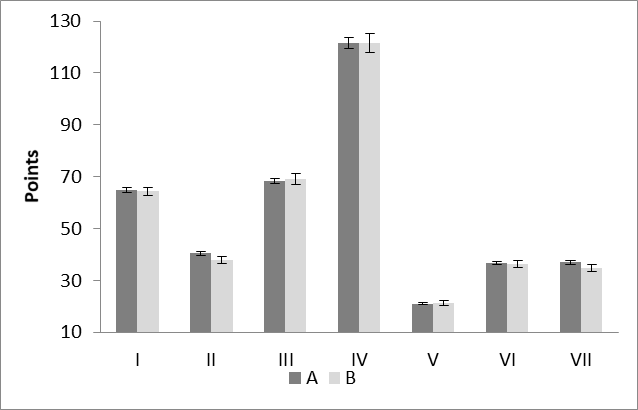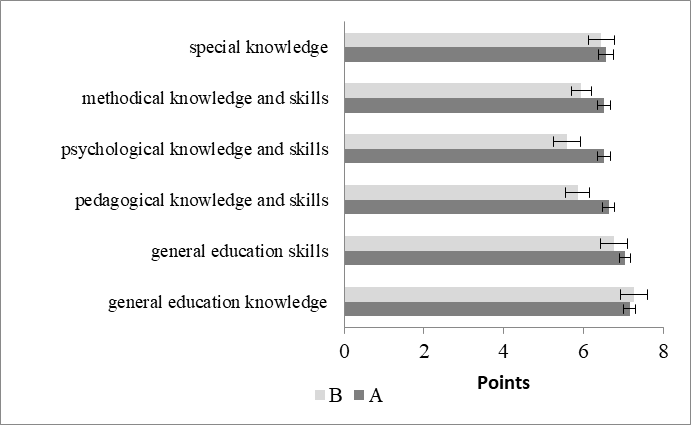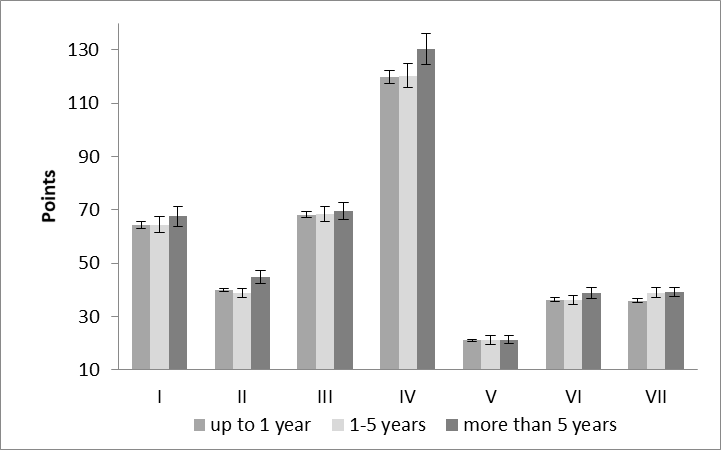Abstract
The relevance of this study is determined by the necessity to improve the pedagogical education on the basis of designing the students training for pedagogical activity, taking into account their professional position. The manifestation of professional position takes place in the course of professional and pedagogical development. This work is aimed at evaluating the readiness of students of pedagogical master course of studies to the following pedagogical activity in accordance with the peculiarities of professional and pedagogical development. All interviewed master students have a high level of readiness for professional and pedagogical development, namely, the development of pedagogical activity planning and restructuring abilities. It was revealed that master students with the teaching experience are distinguished from others by more developed methodological, psychological and pedagogical skills. The results of theoretical and logical analysis of the actual readiness of master students for professional and pedagogical self-development obtained with the help of our survey suggested that modeling and designing of the educational process allow training for pedagogical activity on the basis of a professional position. The materials of the present article are of practical value in connection with the possibility of managing the development process of the professional position of the future teachers in the course of studying at a university.
Keywords: Master’s studentsteacher educationquality of teacher trainingteaching positionprofessional and pedagogical self-development
Introduction
At the present time the problem of ensuring continuity of educational routes of a person at different education levels is considered as particularly actual in connection with innovative tendencies in information society. The research of higher education continuity attracts the attention of Russian and foreign scientists (Laptevet et al., 2006; Jagero et al., 2012; Batrakova et al., 2014). Pedagogical higher education is multi-level and solves the problem of teacher training quality improving. Designing strategies for continuity of higher education implies the improving of teacher training quality at every next level. During the study courses of master program there is a further acquisition of professional pedagogical knowledge. This knowledge is fixed in the course of the practical activity at mastering pedagogical specialties. However, subject training is not always effective enough for successful professional activities (Soelner et al., 2008). Therefore, the training of master students in the field of pedagogical education is aimed not only at increasing their professionalism in the subject area of knowledge, but also at the development of personal qualities that help to realize professional pedagogical activity in terms of updating educational systems. A modern teacher should implement pedagogical support of creative and innovative abilities, spiritual and moral culture of his students (Bondarevskaya, 2010). Thus, the modern teacher should be focused in the educational process on active educational and cognitive activity of school students; building the educational process taking into account the individual characteristics of students; formation of readiness for self-development and continuous education; designing of the social environment of students development in the education system. To implement these tasks, a new type of pedagogical education implies further perfection of the technological component. School teachers are constantly learning new technologies and ways to interact with school students (Delvin & Samarawickrema, 2010).
Together, these features of modern pedagogical activity determine the constant development of teacher’s professional position. The professional position of personality is a ‘stable attitude to the complex of professionally important tasks and conditions of teaching activity and oneself’ (Gorshkova, 2010, p. 28). In the structure of pedagogical position, the emotional-value, cognitive and activity components (Borovkova, 2007, p.241), or cognitive, affective, behavioral and creative components are distinguished (Dementeva, 2011, p.179). The professional position is a source of teacher activity on the basis of an emerging system of intellectual, strong-willed and emotionally valued relations to the world, pedagogical reality and teaching activity (Voronina, 2015). Consequently, the general nature of teaching activity depends on the professional position of the teacher.
Problem Statement
The problem of the study is to assess the ability and readiness of master program students for further pedagogical activity in accordance with the peculiarities of professional and pedagogical development. Constant improvement of teaching activity is connected with the requirement for self-development and the idea of creative self-development of a teacher. The development of teaching abilities, including the ability to professional creative self-development, is a requirement of modern educational standards and an important quality of the professional teacher (Zeleeva & Asafova, 2016). In this regard, the requirements for development and self-development are included in the professional portrait of the teacher based on professional and pedagogical position (Zeleeva, 2016).
The analysis of the basic student’s pedagogical position components during the study courses of master program allows predicting the self-realization of the graduate student in the subsequent pedagogical activity.
Research Questions
In accordance with the indicated problem of the present study, the question was raised: what is actual readiness of master’s students for professional and pedagogical self-development. Earlier in our studies it was revealed that students studying in master programs, in the ranking of aims and motives for obtaining teacher education mainly chose the willingness to self-development (second place). The leading position was given to the interest in the teaching profession and the need for subsequent professional work (Zeleeva & Asafova, 2016). It is proved that the orientation of personality to self-development activates the reflexive position of a master student in innovative pedagogical activity (Zeleeva & Asafova, 2016). The reflexive position of a master student is manifested both in relation to professional activity and the willingness to self-development and self-improvement. Positive dynamics for professional and personal development in the course of training is provided by the mastering of professional and pedagogical problem solving technique, the discussion of views and opinions in practical classes with the use of modern learning technologies.
Purpose of the Study
This article is determined to the analysis of the actual readiness of master’s students for professional and pedagogical self-development. The orientation of the student to self-development during the studies and teaching will contribute to the improvement of professional and pedagogical position. It allows modeling and designing the educational process as a preparation for teaching activity on the basis of professional position. In this regard, the purpose of the work is to assess the ability and readiness of master program students for further pedagogical activity in accordance with the peculiarities of professional and pedagogical development.
Research Methods
In the empirical study, students of the pedagogical master course of studies of the Kazan Federal University took part (2017-2018). A survey was conducted among 72 undergraduates of first year of study. There were students with teaching experience and students who continue the study courses of master's program directly after acquiring the bachelor degree. The author has used a diagnostic technique to determine the level of partial readiness for professional and pedagogical self-development (Fetiskin et al., 2002). This technique allows carrying out a self-assessment of the formation of skills and abilities of self-development in the following components: motivational, cognitive, moral and strong-willed, gnostic, organizational, communicative and aptitude for self-management.
Findings
It was defined that students, continuing the study courses of master program after gaining teaching experience (Group A) and without the experience (Group B) (Figure

The cognitive component of professional and pedagogical self-development consists of educational, subject, psychological, pedagogical and methodological knowledge and skills. On the figure

Taking into account the differences in the duration of master students teaching experience, the author conducted a quantitative analysis. There are three groups with teaching experience: up to 1 year, 1-5 years and more than 5 years (Figure

When comparing the level of students’ readiness for professional and pedagogical development of these groups (with different teaching experience) it was noted that higher values of cognitive (II), gnostic (IV) and communicative (VII) components are distinguished only at master students with teaching experience more than 5 years (Figure

In addition to the above-mentioned indicators of the cognitive component (psychological, pedagogical and methodological knowledge and skills), these students are characterized by the ability to analyze teaching activity, the manifestation of creativity in it (gnostic component), the ability to cooperate and mutual assistance (communicative component). It is necessary to mention the absence of distinctions of all components of self-development abilities and skills formation between groups of students with teaching experience up to 1 year and 1-5 years (Figure
The obtained data show high values of most components of students’ readiness for professional and pedagogical self-development, which corresponds to the relative values of 70-85% of the possible maximum (Table
This points out at a high level of readiness for the development of the organizational component of professional and pedagogical self-development while studying in the teacher´s training master program, which is especially important in the conditions of differentiation and multidimensional modern educational space. A new paradigm which is currently forming in the Russian educational system, connected with multidimensional approach to professional training of specialists of 21st century develops flexibility of students in teaching activity (Yalalov, 2012).
The didactic system of master students training studying on pedagogical field of studies in Kazan Federal University is based on the competence approach, the formation of curricula according to the modular principle and the introduction of modern educational technologies, including interactive and IT–technologies. Practice-oriented training of master students is provided by increasing the share of practical classes (up to 80% of the study time), profession-oriented practice, which is 40% of the total labor intensity of the master program and also individualization of training, containing the implementation of research work and mastering optional modules of choice. The subject functions of master students in the process of learning of professional pedagogical competencies, including practice-oriented allow developing of students’ creative individuality, their abilities to reveal, formulate, analyze and solve creative professional tasks.
Conclusion
It is revealed that among master students there are differences in the readiness for professional and pedagogical self-development, which depend on absence or presence of previous teaching experience. These differences are connected, first of all, with higher values of cognitive component of students’ self-development with teaching experience and due to the lack of psychological, pedagogical and methodological knowledge and skills of students without teaching experience. In our research there is a difference in the ability to the analysis of teaching activity and in manifestation of professional creativity (gnostic component), the ability to cooperation and mutual aid (communicative component) of students with teaching experience more than 5 years. This confirms the dependence of the nature of teaching activity on teacher’s professional position. The obtained data points out the higher level of readiness of master students with less teaching experience to develop these components (communicative, gnostic and cognitive) and their indicators during the study in the program of master studies. In addition, the high level of readiness of all students to improve the skills to plan work and rebuild the system of activities was noted. This is the organisational component of professional and pedagogical self-development during the training in pedagogical course of master studies.
Based on our analysis of the basic components and procedural characteristics of readiness of master students for professional and pedagogical self-development, reflecting their pedagogical position, it is concluded that pedagogical position is formed on the basis of goal-setting motives, discussion and actualization of creative self-development in the course of reflexive analysis. Altogether, consistent development of future teacher’s professional position will contribute to the successful implementation of teaching activities in conditions of renewing educational systems.
Acknowledgments
The work is performed according to the Russian Government Program of Competitive Growth of Kazan Federal University. This work was funded by the subsidy allocated to Kazan Federal University for the state assignment in the sphere of scientific activities №27.9412.2017/8.9.
References
- Batrakova, I.S., Gladkaya V.I., & Tryapitsyn, A.V. (2014). Continuity study of educational programs of master’s and postgraduate students training at the University (on a material of the stated experiment). Vestnik of the Herzen University, 2, 50-56.
- Bondarevskaya, E.V. (2010). Methodological problems of teaching education at the University. Education, 9, 73-84.
- Borovkova, T.I. (2007). Formation of pedagogical position of the future teacher of the higher school. Izvestiya RSPU named after A.I. Herzen, 37, 238-242.
- Gorshkova, M.A. (2010). Active professional position of the future teacher and the background of its development in the educational space. Science, education, technology, 4, 26-29.
- Dementieva, M.A. (2011). Professional position of the teacher - the key to success in teaching. Theory and practice of social development, 7, 178-180.
- Devlin, M., & Samarawickrema, G. (2010). The criteria of effective teaching in a changing higher education context. Higher Education Research and Development, 29(2), 111-124.
- Fetiskin, N.P., Kozlov, V.V., & Manuylov, G.M. (2002). Socio-psychological diagnostics of personality development and small groups. Publishing house of the Institute of Psychotherapy.
- Jagero, N., Mkitaswidu, Beinomugisha, P., & Rwashema, E. (2012). The Perceptions of Postgraduate Students towards the Teaching Strategies Employed By CENTED Lecturers in IIUM. International Journal of Academic Research in Progressive Education and Development January, 1.
- Laptev, V.V., Pisareva, S.A., & Tryapitsyna, A.P. (2006). Training and certification of highly qualified staff in the field of human and social sciences. Analysis of the experience of universities in Europe and Russia. St. Petersburg: Faculty of Philology St. Petersburg state University.
- Soellner, R., Scheibner, N., Hapkemeyer, J., & Fink, C. (2008). Erwartungen an das Praktikum im Studium – Anregungen zur Entwicklung von Curricula. Zeitschrift für Hochschulentwicklung (ZFHE), 3(4), 34-46.
- Voronina, M.V. (2015). Features formation of future teacher’s professional position during his study at the University. Bulletin of TSPU, 7(160), 128-132.
- Yalalov, F.G. (2012). Multidimensional pedagogical competences. Education, 4, 45-53.
- Zeleeva, V.P. (2016). Communicative approach to the development of pedagogic thinking and actualization teaching positions graduate students. Actual problems of pedagogy and language education: the scientific and practical conference with international participation. Kazan: Publishing house of KFU, 114-127.
- Zeleeva, V., Asafova, E. (2016). Continuity in pedagogical orientation strategies of master and postgraduate students. III International multidisciplinary scientific conference on social sciences and arts (SGEM 2016), 24-30 Aug.2016, Albena, Bulgaria, 647-654.
Copyright information

This work is licensed under a Creative Commons Attribution-NonCommercial-NoDerivatives 4.0 International License.
About this article
Publication Date
05 September 2018
Article Doi
eBook ISBN
978-1-80296-044-0
Publisher
Future Academy
Volume
45
Print ISBN (optional)
-
Edition Number
1st Edition
Pages
1-993
Subjects
Teacher training, teacher, teaching skills, teaching techniques
Cite this article as:
Asafova, E., & Fazlyeva, A. (2018). Didactic Basis In Teacher Training: Developing A Professional Position Among Graduate Students. In R. Valeeva (Ed.), Teacher Education - IFTE 2018, vol 45. European Proceedings of Social and Behavioural Sciences (pp. 113-120). Future Academy. https://doi.org/10.15405/epsbs.2018.09.13

